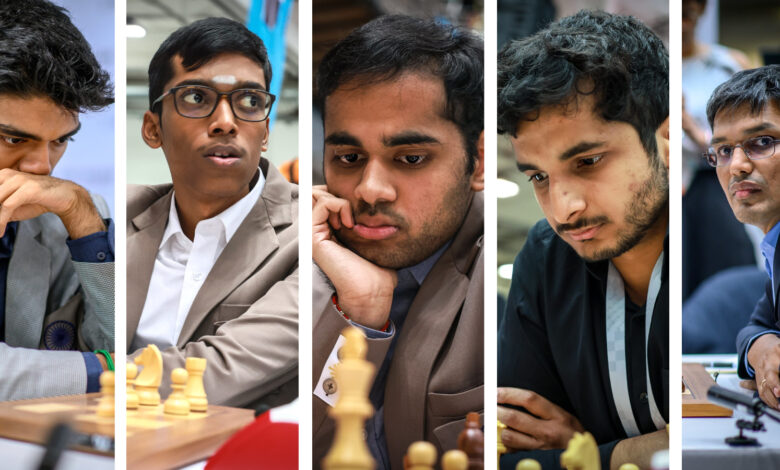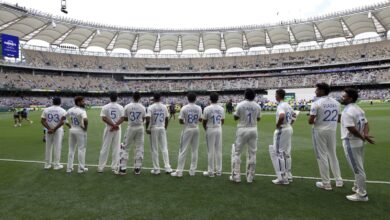India’s domination at Chess Olympiad: 32 games, zero defeats

the time the end was near, Gukesh had taken to prowling around his seat like he was circling a hapless prey. Iran’s Parham Maghsoodloo, Gukesh’s crestfallen opponent, was left clutching his forehead with both palms like a man who had gambled away his life’s savings guided a hunch. When he resigned at last, the Iranian could not even bear looking Gukesh in the eyes. His heartbreak was understandable.
After 25 moves in the book on the top board of the India versus Iran game in the 8th round of the Chess Olympiad, Parham had held a 10-minute advantage on the clock and had two additional pawns on the board compared to 18-year-old Gukesh, the boy who had pipped him to secure a spot at the Candidates chess tournament late last year.
Iran’s Parham Maghsoodloo greets India’s Gukesh ahead of their clash on Thursday. FIDE via Michal Walusza
But over the course of four moves, where he erred thrice, Maghsoodloo had managed to cause irreversible damage to his chances of beating Gukesh. The first make was gifting his only remaining knight away for free on move 29, the second make was taking Gukesh’s knight off the board when he could have chosen to chop the head of Gukesh’s queen (which would have also cost him his own queen) on move 31 and the final make was dropping his rook to the b2 square rather than moving his king to a safer square on move 32.
INTERACTIVE: How Gukesh beat Parham Maghsoodloo at the Chess Olympiad:
Playing against Gukesh, who is one of the best calculating players in the world at the moment, even one make can be fatal. Against Gukesh, Maghsoodloo had managed three in four moves. No surprises then that the Iranian threw in the towel two moves later to hand Gukesh his sixth win in seven games, with the seventh game having ended as a draw.
Over on the other boards, Maghsoodloo’s teammates were having equally wretched luck as him.
Bardiya Daneshvar, playing with white pieces, also resigned after 36 moves as Arjun sent a bulldozer of a rook, protected a pawn which was threatening to promote, to clean up house on the back rank.
INTERACTIVE: How Arjun Erigaisi beat Bardiya Daneshvar at the Chess Olympiad:
Vidit Gujrathi, playing on the fourth board, also arm-twed Idani Pouya into resigning after 40 moves.
INTERACTIVE: How Vidit Gujrathi beat Idani Pouya at the Chess Olympiad:
Only Amin Tabatabaei, playing on board two for Iran, managed to escape with a draw against Praggnanandhaa.
INTERACTIVE: How Praggnanandhaa was held to a draw Amin Tabatabaei at the Chess Olympiad:
The Indian team’s record at the ongoing Budapest Olympiad thus reads: 32 matches played, zero matches lost. A measure of India’s dominance at the Chess Olympiad is that all four of the Iranians had not lost a single match at the Olympiad. In Round 8 against India, Iran was introduced to defeat thrice.
Maghsoodloo, in particular, has been in rampaging form at the Olympiad, even holding world no 1 Magnus Carlsen to a draw with black pieces.
In the form of Gukesh and Arjun Erigaisi on the first and third board respectively, the Indian team has two boxers capable of landing haymakers that not many fighters can take on their chin and still stand upright on the canvas. Add to that, players like Praggnanandhaa, Vidit Santosh Gujrathi and Pentala Harikrishna, who can grind out draws on demand.
Just like Gukesh, Arjun has also had just one draw in eight matches, winning the other seven. He’s the only member of the Indian team who has had no rest at the Budapest Olympiad. Praggnanandhaa has now claimed five draws in seven games while Vidit has two draws from seven games.
The victory over Iran means that the Indian team now have 16 game points in the tournament with three more rounds left while Iran who were second in the standings ahead of round 8 are stuck on 13 points after the defeat.
The unique format of the Olympiad, which is being played in the Swiss system, means that teams which are closest in terms of points play each other each round. But the format also dictates that no teams can play each other twice. This means that the Indian team cannot play a team like Hungary, Serbia or China since they have already faced these teams in previous rounds. This leaves the prospect of India facing the top seeded United States of America (13 points after their win over France on Thursday) and the defending champions Uzbekan (14 points after defeating Serbia) in the final three rounds.
The Indians, particularly Gukesh, will relish taking on Uzbekan in particular at the Olympiad as it could mean a clash of prodigies between Gukesh and Nodirbek Abdusattorov on the top board. It was Nodirbek who had halted Gukesh’s rampaging run at the Chennai Olympiad two years ago there relegating the Indian team to a bronze medal.




